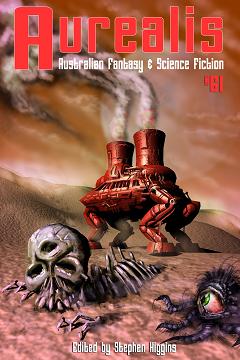Reviewed by Matthew Nadelhaft
This is my first encounter with Aurealis, the journal of Australian speculative fiction. These national vehicles interest me, ever since I reviewed a slew of Canada’s On Spec for the print version of Tangent a billion years or so ago. I didn’t come away with any great sense of Canadian-ness, then, and still feel that accepting stories only from your own country-people or other in-group, however laudable your intentions of promoting a particular literature, only defeats diversity and limits the overall publication opportunities for all. So I’m eager to find, at least, a sense of place, a bit of cultural/historical education to justify, to me, the remit of these sorts of periodicals.
In that regard, this issue of Aurealis did nothing for me. The two stories published herein had no particular Australian connection, other than having been written by Australians. Reviewing them for their own merits, of course, is what I’d have been doing anyway, but it still leaves me questioning the point of a nationally-bounded marketplace.
Sophie Mason’s “Restless” is a ghost story about art. It begins with the narrator having a foreboding (if relatively nondescript) dream. The dream sequence, unfortunately, has no real purpose other than to provide the author with a way of beginning the story: while the events of the dream are a prelude to the events of the story, there is no reason why the narrator had the dream, nor does the story in any way require it. The rest of the plot takes the narrator, with her artistic twin brother, to an art museum where she has an encounter that recapitulates her dream. Tracking down the truth behind what she saw she learns about the relationship between a handful of deceased figures: a painter, his former girlfriend, and his sister.
This relationship impinges upon reality through Jamie, the narrator’s brother, who becomes interested in the work of the deceased painter. There isn’t any convincing explanation for Jamie’s interest, however, and the events that allow the ghost story to progress feel a bit too contrived. While the ending of the story is creepy, it is hampered by awkward prose and no real feeling of urgency.
“Kernel,” by Sean Monaghan, is a more successful story, although with a somewhat inverted progression, coming to a less satisfying conclusion from a strong start. With crisp and clear prose, the story follows a rather confused astronaut, Genn, as his ship prepares to make “the transition” at near-light speed. Genn has something called a “kernel,” a small device which talks to him occasionally. Genn needs all the help he can get: he is befuddled to the point of cluelessness. At first I was annoyed by Genn’s helplessness; how could an astronaut be so out of it? Monaghan’s depiction of space travel is indeed bewildering, but Genn’s incomprehension wasn’t mirrored by either of his companions.
Eventually I realized, as intended, that Genn’s lack of comprehension was the point of the story and even of the space voyage depicted. While the revelation that explains why Genn is bewildered by the events in which he finds himself (literally) is the crux of the story, it is not the end of it. And while this revelation (no, I won’t spoil the surprise, even though not doing so limits my ability to discuss the concluding section of the story) does explain a lot, it also requires us to accept some fairly unbelievable science (even more unbelievable than FTL travel) and economy. About that conclusion I’m torn. I’m not sure it was necessary, though it is well-written, even poetic, but its lack of necessity interferes with the tight structure, the emotional power of the rest of this story. These are pretty large qualms, I recognize, but I still found the story well-written and emotionally compelling.
